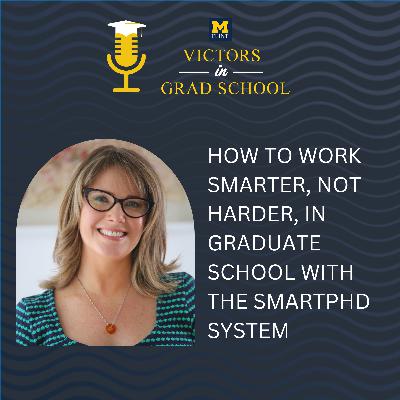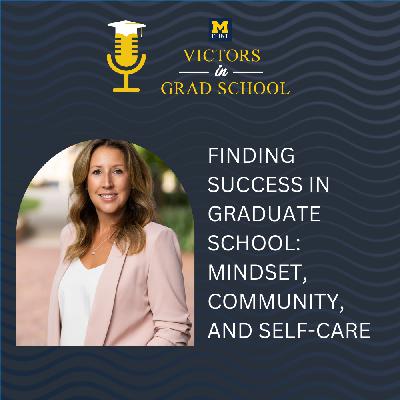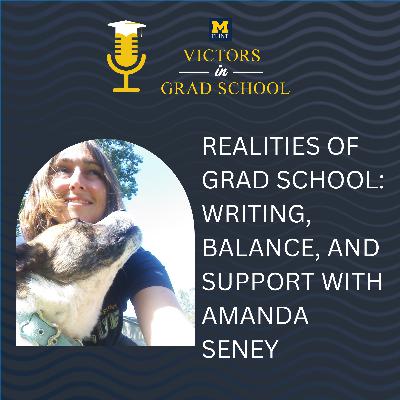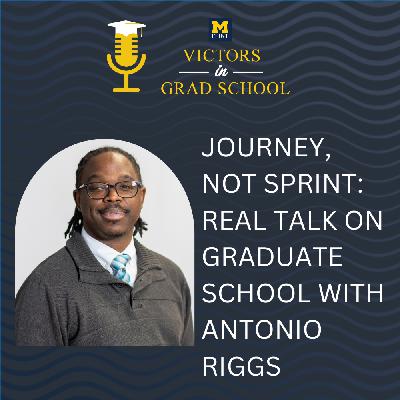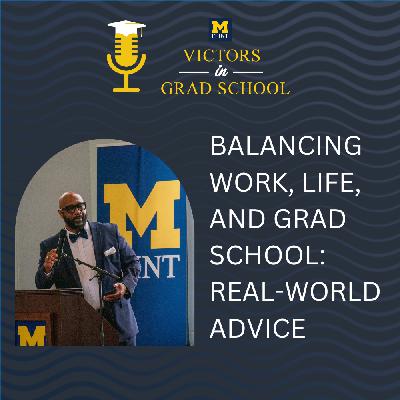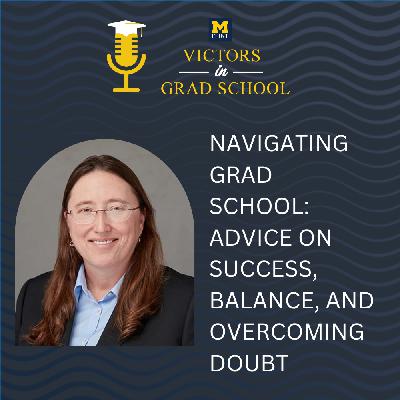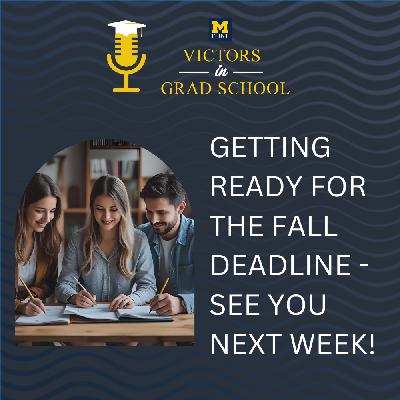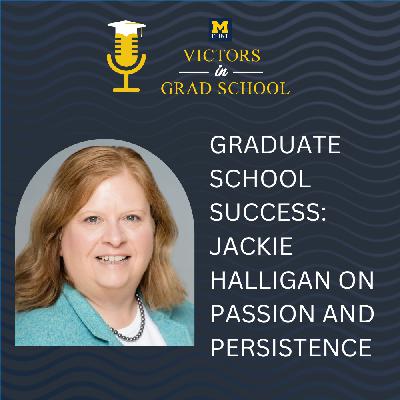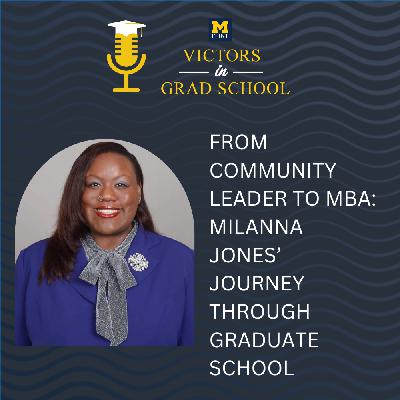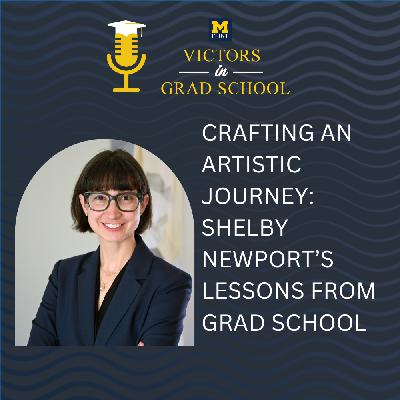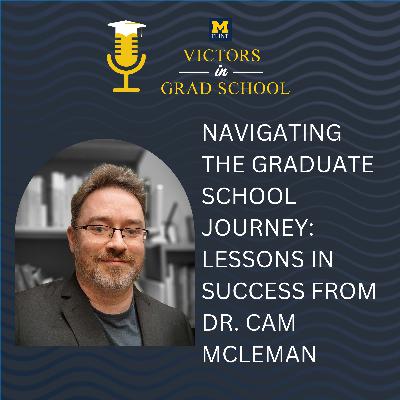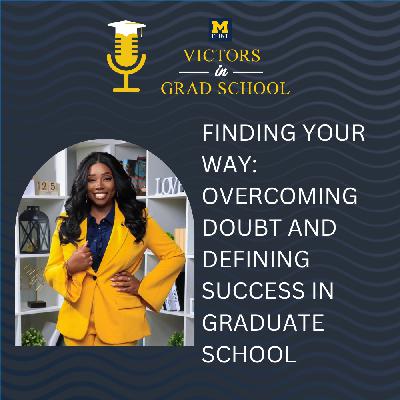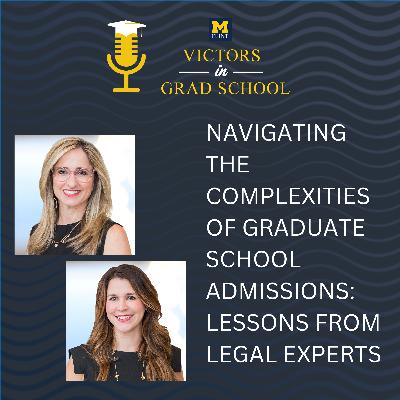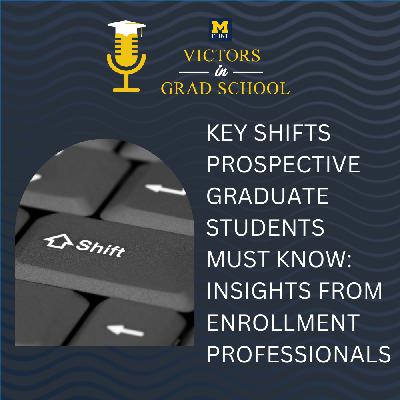Finding the Best Grad School Fit: Academic, Personal, and Professional Advice
Description
Choosing the right graduate program is a big decision that can shape your academic, professional, and personal future. In this episode of Victors in Grad School, Dr. Christopher Lewis brings together a diverse panel of enrollment management professionals and industry experts from across the country to answer a critical question: What’s one piece of advice you would give students to help them better evaluate whether a program is the right fit academically, personally, or professionally? The insights shared in this episode are a goldmine for anyone considering graduate school or helping others navigate the process.
One major theme throughout the episode is the importance of self-reflection and self-honesty. Many experts, including Sabrina Brown (UNC Charlotte) and Tony Fraga (Direct Development), urge students to look beyond academic rankings or prestige. Instead, they recommend starting with your "why"—what are your true motivations and career goals? Take the time to evaluate your learning style, your needs for support and community, and how a program aligns with your personal aspirations and circumstances.
Research and connection are another recurring theme. Repeatedly, the guests encourage prospective students to look beyond brochures and websites. Instead, make meaningful connections: talk to faculty, current students, and especially alumni in roles or industries you aspire to. Emily Dayton (UC San Diego) and Marcus Hanscom (Direct Development) stress the value of these conversations in revealing the actual culture of a program, typical career outcomes, and the lived experiences of people just like you.
The academic environment matters too, but it’s not the whole story. Paul Brandano (UCLA Anderson) and James Monahan (SIU Edwardsville) highlight the importance of evaluating curriculum, faculty engagement, and the level of rigor honestly—you want to be challenged, but also supported.
Location and atmosphere are also crucial elements. As Ben Webb (QS) and Santavaya Jordan (Vanderbilt University) point out, a program’s fit is not just about classes and credentials but also about the city or campus setting and the mental health resources available. Can you picture yourself thriving in this new environment?
Finally, don’t forget to be proactive! Reach out for more information, as Matt Bohlen (Carnegie) explains—it’s worth the extra effort to piece together what life as a student there truly looks like.
If you’re gearing up for grad school or supporting someone on that journey, this episode is packed with candid, actionable advice. Listen in for a wide range of perspectives and start charting your own path to graduate school success!
TRANSCRIPT
Dr. Christopher Lewis [00:00:01 ]:
Welcome to Victor's in grad school, where we have conversations with students, alumni, and experts about what it takes to find success in graduate school.
Dr. Christopher Lewis [00:00:11 ]:
Welcome back to Victor's in grad school. This week, we have a great opportunity to be able to learn from other enrollment management professionals. I recently attended the National Association of Graduate Admission Professionals or NAGAP. And at that conference, I spoke to a number of enrollment management professionals and individuals working within industry that are working with higher education about a number of questions to help you in the journey that you are on toward graduate school. This week's question was, what's one piece of advice you would give to students to help them better evaluate whether a program is the right fit academically, personally, or professionally. I hope that you enjoy the answers to this question and that it will help you on the journey that you are on.
Stacy Goldstein [00:01:07 ]:
Hi. This is Stacy Goldstein with UC San Diego at Rady School of Management with the master professional accountancy program. I work in our graduate department in admissions, and my big thing is being your cheerleader for my students. One piece of advice that I like to give is utilize the resources you have now and work backwards. What does that mean? If you're in school right now, you're getting career resources, have someone look at your resume. So utilize those connections, get to know your faculty. Sometimes they're board members or they sit or they still are a partner. Make those connections, not just LinkedIn, but get to know them.
Stacy Goldstein [00:01:42 ]:
And what I mean by work backwards, then follow them on LinkedIn. What job do you wanna do? Look at their profile, see what they did for their graduate studies, see what types of jobs they got, and then that will gauge of which direction and which graduate school you choose. Go for the dream job.
Donna Wang Su [00:02:01 ]:
My name is Donna Wang Su. I am the associate director for graduate admissions and financial aid at
Jamie Crampton [00:02:05 ]:
Northwestern University, Medill School of
Donna Wang Su [00:02:05 ]:
Journalism, Media, Integrated Marketing Communications. I'm Medill School of Journalism Media Integrated Marketing Communications. I'm a huge fan of strategic planning. So I think to do research, look at careers, jobs that you say to yourself, I could see myself doing that. And doing those kind of informational interviews with people and seeing, you know, what paths have taken them in that direction, whether it was the right mentorship, if it was the right degree, what was it part of the degree? Was it the network? Was it the curriculum? And kind of letting that guide their path there.
Santavaya Jordan [00:02:40 ]:
My name is Santavaya Jordan. I am the engineering graduate recruiter at Vanderbilt University, and I recruit only for our graduate programs in engineering. One great thing I would say is looking at not just the school's ratings, but where the school is located and if you can be in that environment mentally. It's very important for your mental health when you're in a new environment, not only dealing with new people and experiences, but actually the other outlets within that area within the city for you to go to, resources that are on campus, resources that are off campus for your mental health. And that's extremely important, especially if you have other family factors or other life situations that may contribute to or may affect how you matriculate throughout your program.
Paul Brandano [00:03:23 ]:
I'm Paul Brandano. I'm the executive director of the Master of Science in Business Analytics at UCLA Anderson. Personally, I'm thinking all the time about, first, who they are. So I've I've gotta get to know them quite well before I even begin to answer the question. It's pretty clear from our perspective that there's a certain baseline in a program like ours, which is highly quantitative. And so when we're looking for our fit, we're looking for someone who can swim, not sink. And that's academically, of course, in all the quantitative courses that they might take on with us, and they're quite diverse. So that could be a, you know, a math major, it could be an accounting major, it could be a finance major, undergrad, it could be a computer scientist or an engineer.
Paul Brandano [00:04:00 ]:
But they've gotta have some common ability to manage the higher level math. Ideally, they will have taken multirabial calculus and linear algebra. And so if they do have those things, that starts the conversation. Because after that, you're really looking for how much of a fit are they going to be in the next phase of their life, which is their career. And they've just got a short window with us. I think the advantage of an MBA is that you get to be there a while. You get to evaluate for yourself what's the right path, where am I going, and perhaps choose one of those areas I was mentioning, finance, operations, etcetera. Here, we just know that they're going to be specialists and ideally have as broad a breadth of skill sets across those functional areas as possible so that they can, in their career, jump between marketing and finance, etcetera, or between industries.
Paul Brandano [00:04:43 ]:
And so what I'm looking for and and and I'm evaluating them, they're evaluating us is, you know, how much of that do they have naturally? And when, you know, just like when you go to a conference or listening to a podcast, you're you're kind of moved more by a person who has that natural charisma, that x factor. And so we're definitely looking for that. Right? You know, is it if you've got those things that sort of stand out to everyone as they've got some magic in them, they're on my admit list. And I th



